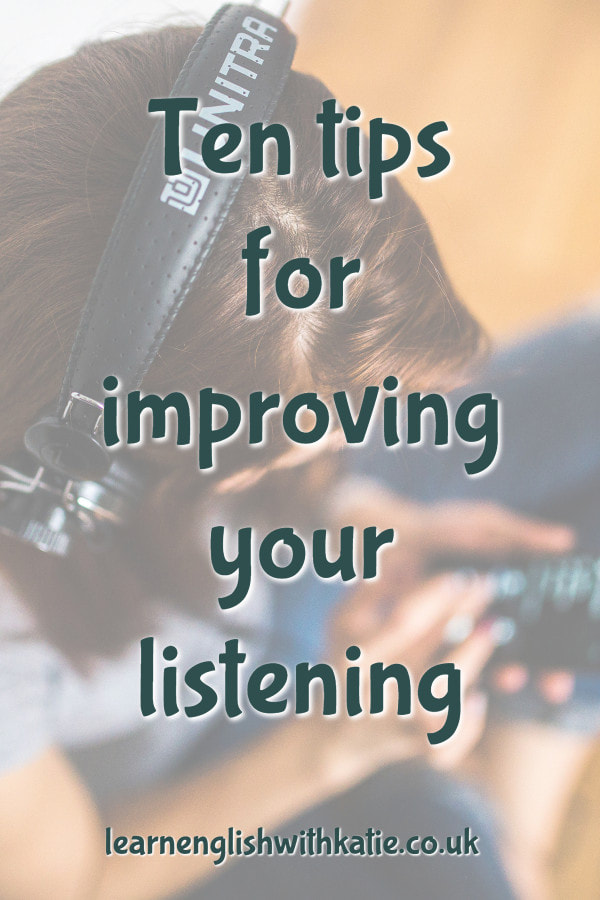|
Do you want to improve your listening skills? The most important thing is to practise, practise, practise but if you would like more tips, keep reading. In this post, I'll give you some more ideas for how to get better at listening and where you can find some good materials. 1. The right level Find listening activities that are the right level for you. If the listening is too difficult, you won’t learn anything from it and you will lose confidence and motivation. (When I lived in Poland, I listened to the radio and it didn’t help me at all because I was a beginner and the radio was much too difficult for me.) You don't want anything that's too easy either. 2. Where to find online activites Simpleenglishvideos.com is a great website which has videos at three different levels. Learnenglish.britishcouncil.org is also a good place to find listening activities and videos. Click on “skills” or “general” and then choose something for your level. There are also several British Council apps available. (If you search on YouTube for “elementary listening” or “intermediate listening”, for example, you will also find many videos, although some may be better than others.) You can find more suggestions in this post. 3. Easy listening Duolingo is good for low levels. You can listen and read at the same time or you can try listening to the sentences before you read them. There is a website and an app but I think the website is better. 4. Intermediate listening "BBC Learning English" has lots of excellent videos for lower intermediate and intermediate students. They have a website and a YouTube channel as well as social media pages. My favourites on BBC Learning English are the Lingohack videos. The British Council website (see point 2) is also good, especially Word on the Street. 5. Upper Intermediate listening For upper intermediate students, I recommend News Review on "BBC Learning English". Also, look at the audio zone and video zone sections on the British Council website. 6. Advanced listening If your English is advanced, you can watch or listen to anything you like! You don’t have to use materials made for students but you can use videos and podcasts for native speakers. The BBC news website has some videos and I also suggest listening to TED talks. 7. TV and films Watch TV shows and films. If you watch Netflix or DVDs, you can usually watch with subtitles. At first, it’s OK to have subtitles in your own language. When you get better, you can change the subtitles to English. Eventually, you will be able to watch without using subtitles at all. Another suggestion is to watch something twice, first with and then without the subtitles. It might be boring to watch a whole film twice but you could watch your favourite ten minutes again. 8. Songs Listen to songs. You can find music videos on YouTube. Some of them include the lyrics (words) or you can use Google to find the words. I also recommend lyricstraining.com or the Lingoclip app. This turns listening to songs into a game. 9. Active listening Be active when you listen, not passive. Really try to understand what you’re listening to. Make a note of new words that you learn and what they mean. You could even try to make notes, depending on the type of listening. Tell somebody else what it was about or just tell yourself in your head! Before you listen, try to guess what you will hear. Think about what questions you would like to be answered. While you listen, see if your predictions were correct or if your questions are answered. 10. Conversation Don’t forget that conversation is also 50% listening, or at least it should be! Try to find people to talk to and listen to. If you don't have anyone to talk to, you might find this post helpful. 11. Read and listen Read and listen at the same time. Watch a video with subtitles. Listen to songs and read the lyrics. Use an app such as beelinguapp. A lot of the videos I’ve mentioned above have transcripts or subtitles so you can read and listen. This is especially good for students who understand well when they read but find listening more difficult. Make sure you really listen though. It’s easy to stop listening and just read. 12. Keep it interesting Lastly, and perhaps most importantly, find something that you enjoy or find interesting and you will be much more motivated to listen and persevere. Would you like more tips on how to learn English and free English lessons by email? Sign up for my free newsletters here:
1 Comment
1/10/2022 01:59:46 am
Im poor in english can you help me i want to learn english speaking and writing.thank you
Reply
Your comment will be posted after it is approved.
Leave a Reply. |
About the blogFollow the blog for mini lessons and tips on how to improve your English. Categories
All
Archives
July 2024
|

 RSS Feed
RSS Feed
